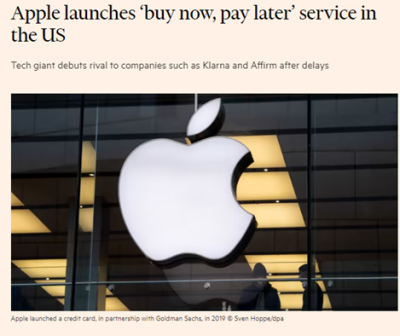If you would like to receive weekly updates like this, sign up here.
Good things always come to those who wait.
And if, like me, you are an avid student of the 18.6-year Real Estate Cycle, you sometimes can be waiting for a decade or two sometimes!
Nonetheless, recent news caught my eye.
News I knew was coming. Not when exactly, but that eventually the time would come when it would finally appear.
And it didn’t disappoint.
I’ve written to you about the development before, you know.
At the time it was an interesting thought exercise – but one that many folks far smarter than me believed was inevitable.
I thought it would be Amazon or Google that would be the first mover here…but they have been beaten to the punch by another tech behemoth. The world’s most valuable company, Apple.
Take a look at the following headline in the Financial Times:

Source – FT
It’s a sober headline. But its significance is absolutely huge! You simply must fully grasp what this announcement means.
And today I’m going to tell you why it’s such huge news.
Let’s look at why the buy-now-pay-later (BNPL) credit system is still so popular, what Apple’s entry into this market means for the established players and what it tells us about the upcoming peak of the real estate cycle.
Adam and Eve were right to pick that Apple!
Let’s take a few moments to reflect on how we came to this point and why precisely Apple decided to target this segment of the loan market.
Apple’s recent entry into the “buy now, pay later” (BNPL) market with its Apple Pay Later service is poised to have significant implications for the credit landscape and real estate market.
With this move, Apple has joined a growing number of fintech firms and traditional banks that are expanding into the BNPL space, which has become increasingly popular in recent years, especially in the e-commerce industry.
The rise of BNPL services has been driven by a desire to make credit more accessible and affordable for consumers, particularly millennials and Gen Z, who may not have access to traditional credit options such as credit cards or loans.
By offering instalment payments with little or no interest, BNPL providers aim to attract more consumers and drive-up spending, which in turn can drive up credit creation.
This is where Apple’s entry into the BNPL space is particularly interesting.
Apple has a massive user base of loyal customers who are willing to pay a premium for its products and services.
With Apple Pay Later, Apple is essentially offering its customers a new credit option that can be used to finance their purchases.
This means that Apple’s customers will have access to more credit, which could lead to increased spending and credit creation.
At the same time, credit creation can drive up the price of land and real estate, which is a key component of the 18.6-year real estate cycle.
As more credit is created, more money is available to be spent on real estate purchases, which can drive up prices.
With Apple’s entry into the BNPL space, we could see even more credit creation in the coming years, which could further fuel the real estate market.
This is something to keep in mind as we approach the peak of the 18.6-year real estate cycle, which is predicted to occur in the mid-2020s.
In conclusion, Apple’s entry into the BNPL space is likely to facilitate even more credit creation and drive-up spending, which could have significant implications for the real estate market.
Here is how Apple will end up owning everything.
Yes, this news is huge. Every time in previous real estate cycles, the ability for new and innovative ways to force easy credit down our throats really starts to wind up.
Here we are, once again.
From the FT article I referred to above.
Apple debuted its long-anticipated buy now, pay later programme in the US on Tuesday, as the $2.5tn tech giant expands further into finance in a challenge to incumbent firms including Klarna and Affirm.
The iPhone maker unveiled plans for Apple Pay Later at its developer’s conference in June. After several months of delays, “select” US consumers will be invited to use the finance tool on Tuesday, the company announced.
Apple Pay Later is built into the Wallet function of the iPhone and lets users pay for online goods and in-app services in four payments spread over six weeks. The zero-interest loans of between $50 and $1,000 will be made through a wholly owned subsidiary, Apple Financing.
In 2019, Apple partnered with Goldman Sachs to develop and promote its Apple credit card.
Goldman Sachs will play a role again here in facilitating Apple Pay Later, by allowing Apple access to Mastercard’s network since the iPhone maker lacks a licence to issue payment credentials directly.
The wallet will be purpose built into future Apple phones. This keeps consumers well entrenched into Appels ecosystem. It also will produce an enormous amount of data about the spending habits of its own customers.
And likely rate you, without your knowledge, about what type of credit risk, or otherwise, you may be.
Is this how Apple, and other tech companies, find their way into lending against real estate?
Not so fast. Even today, in the US and elsewhere, you still need to hold a banking licence. And Apple lacks this.
So, it made me sit up when I learnt J P Morgan CEO Jamie Dimon said just after Apple’s announcement of this move last year.
“That’s a bank … If you move money, hold money, manage money, lend money, that’s a bank.”
Makes sense once you realise Apple alone will underwrite and fund these short-term loans.
But that’s not the treasure they seek, its your data it wants, giving it front row seats into your own indebtedness, credit suitability and even your current health and ability to pay back future loans.
Every time you search for a new mortgage or credit card, you are using your mobile phone or more likely via the Google browser on your laptop.
It allows these tech giants to both offer you what they believe is right to you, on their terms, while allowing a large degree of sidelining regulatory oversight, which was put in place to keep you safe.
And if it’s not you or me, then it’s our children. How would you feel about that?
Is it even possible to know?
If this trend is irreversible, what side are you on?
I feel this is a wave of change that you simply cannot hide from nor ignore any longer.
The groundwork being laid here by these huge tech companies is too deep, far reaching and aimed at one thing.
That is, to gain market share in the most lucrative form of borrowing on earth.
A loan to buy property and land.
This will come to fruition sooner than you think, and you need to be ready now to take advantage of it.
The US land market is already beginning to break out to the upside in various states. I’ve written to you about the historic amount of credit required to build what President Biden has mandated via the Infrastructure Reform Act.
All these gains will, once manifested, find themselves into the price of land. Its scientific, it’s inevitable.
It must happen. Therefore, it will happen.
This trend is happening in front of you regardless of where you live. Look outside.
You should know I’m not going to keep repeating what should be plainly obvious by now.
Would Apple moving into the mortgage market make them the richest single company on earth? Maybe.
Perhaps if they do you should research the pros and cons of making a long term investment in Apple shares.
Companies exposed to the land market peak later this decade are expected to outperform should history repeat.
If you are a current Apple customer in the future don’t be surprised if you receive a notification telling you about your pre-approval for a loan of $700K, should you wish to apply. It would literally take a minute.
They don’t need to ask anything about you, you tell them about your whole life via your iPhone.
Traditional banks will simply never compete with this in-built advantage. You may even get discounts on the interest rate if you use your loan to purchase a house that has Apple products built in.
Security cameras, intelligent electricity and gas use, automatic bill payments, smart appliances, all Apple made and controlled by your phone.
And if you’re late with a repayment? Oh, Apple will then lock you out of your home until you do pay. You need an Apple phone to unlock the doors. Oh, and don’t break in, your Apple security cameras will alert police.
Locked into the Apple ecosystem, for the rest of your life.
But I’m speculating. I’m sure that will never happen. Right?
The bigger picture for you is the fact yet more evidence now comes to hand that will propel property and the stock market to never seen heights.
Do you want to wallow in the negativity of Credit Suisse or SVB bank collapses today or understand the fact that traditional banks are all about to be made mostly redundant by the biggest tech companies on earth.
And they’ll do it by stealing the bank’s own playbook.
If you fall into the later category, then it’s time to get educated.
Start here with a membership to the Boom Bust Bulletin (BBB). Give me the opportunity to take you in depth into the cycle.
Learn about the over 200-year history of the 18.6-year Real Estate Cycle and why even today it continues to repeat like clockwork.
It will teach you how to decipher the news that we get bombarded with every day to focus solely on what truly matters.
No more negativity and noise, just the science of the economic rent and the timing inherent in the real estate cycle.
This is all you need to succeed.
The history of the cycle tells us which trend you need to be on. It is time for credit creation on steroids, in ways and means beyond what’s available now. And I want you on the right side of this trend.
And that’s how the BBB can help.
As a Boom Bust Bulletin member you will receive 12 monthly editions a year detailing all the key turning points of the cycle, a deep dive into the most important markets across the globe and ways that you can personally benefit from this knowledge.
All derived from our unique and proprietary research – which you’ll not find anywhere else.
Plus, you’ll receive exclusive invites to BBB member-only webinars when we run them.
All this for just US $4 a month, less than a takeaway coffee.
Best wishes,

Darren J Wilson
and your Property Sharemarket Economics Team
P.S. – If you would like to receive weekly updates like this, sign up here.
P.P.S – Find us on Twitter here and go to our Facebook page here.
This content is not personal or general advice. If you are in doubt as to how to apply or even should be applying the content in this document to your own personal situation, we recommend you seek professional financial advice. Feel free to forward this email to any other person whom you think should read it.



